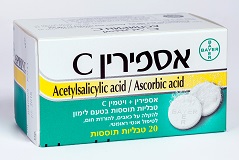Quest for the right Drug

אספירין C ASPIRIN C (ACETYLSALICYLIC ACID, ASCORBIC ACID)
תרופה במרשם
תרופה בסל
נרקוטיקה
ציטוטוקסיקה
צורת מתן:
פומי : PER OS
צורת מינון:
טבליה תוססת : TABLETS EFFERVESCENT
עלון לרופא
מינוניםPosology התוויות
Indications תופעות לוואי
Adverse reactions התוויות נגד
Contraindications אינטראקציות
Interactions מינון יתר
Overdose הריון/הנקה
Pregnancy & Lactation אוכלוסיות מיוחדות
Special populations תכונות פרמקולוגיות
Pharmacological properties מידע רוקחי
Pharmaceutical particulars אזהרת שימוש
Special Warning עלון לרופא
Physicians Leaflet
Overdose : מינון יתר
4.9 Overdose Salicylate toxicity can result from chronic, therapeutic overdose and from potentially life- threatening acute poisoning (overdose due to inadvertent intake in children, including accidental intoxication). Chronic salicylate poisoning can be insidious, as the signs and symptoms are non-specific. Mild salicylate poisoning generally occurs following repeated intake of high doses (> 100 mg/kg/day over 2 days can be toxic). Symptoms include drowsiness, dizziness, tinnitus, hearing impairment, sweating, nausea and vomiting, headache and confusion and can be controlled by reducing the dose. The main feature of acute poisoning is a severe acid-base imbalance, which can vary with age and the degree of poisoning. The most common sign of acute poisoning in children is metabolic acidosis. The severity of poisoning cannot be assessed on the basis of the plasma concentration alone. The absorption of acetylsalicylic acid can be delayed by reduced gastric emptying, concrement formation in the stomach or as a result of ingestion of gastro-resistant medicinal products. Tinnitus can occur at plasma concentrations of 150 to 300 mcg/mL. Further severe adverse effects can occur at concentrations over 300 mcg/mL. The pathophysiological effects of salicylate poisoning are complex. Mild-to-moderate poisoning manifests as nausea, vomiting, tachypnoea, hyperventilation, respiratory alkalosis and diaphoresis. Signs of moderate-to-severe poisoning are: respiratory alkalosis with compensatory metabolic acidosis, hyperpyrexia, impaired glucose metabolism and ketosis, tinnitus, deafness, gastrointestinal bleeding, respiratory disorders (ranging from hyperventilation to respiratory arrest), cardiovascular disorders (ranging from arrhythmia to cardiovascular shock), fluid and electrolyte disturbances (ranging from dehydration to kidney failure), haematological conditions (ranging from antiplatelet effects to coagulopathy), toxic encephalopathy and CNS depression (ranging from lethargy to coma and seizures). Treatment of acetylsalicylic acid poisoning is guided by the extent, severity, and clinical symptoms and is based on standardised procedures for poisoning. In severe cases, haemodialysis may be necessary. The first emergency measures should be to accelerate the excretion of the drug and to restore the electrolyte and acid-base balance. The literature includes isolated reports of acute and chronic ascorbic acid overdose. In patients with glucose-6-phosphate dehydrogenase deficiency, this may lead to oxidative haemolysis, disseminated intravascular coagulation and significantly elevated oxalate levels in serum and urine. Elevated oxalate levels may lead to calcium oxalate deposits in dialysis patients. In addition, some reports show that high doses of ascorbic acid (oral or IV) can cause calcium oxalate deposits, calcium oxalate crystalluria (in patients predisposed to increased crystal aggregation), tubulointerstitial nephropathy and acute renal failure (result of calcium oxalate crystals).

שימוש לפי פנקס קופ''ח כללית 1994
לא צוין
תאריך הכללה מקורי בסל
לא צוין
הגבלות
לא צוין
מידע נוסף
עלון מידע לצרכן
29.09.21 - עלון לצרכן אנגלית 25.07.22 - עלון לצרכן אנגלית 12.05.22 - עלון לצרכן עברית 29.09.21 - עלון לצרכן ערבית 25.07.22 - עלון לצרכן ערבית 28.09.24 - עלון לצרכן עברית 29.11.11 - החמרה לעלון 15.05.12 - החמרה לעלון 07.07.20 - החמרה לעלון 13.09.20 - החמרה לעלון 25.06.21 - החמרה לעלון 12.05.22 - החמרה לעלון 25.07.22 - החמרה לעלוןלתרופה במאגר משרד הבריאות
אספירין C